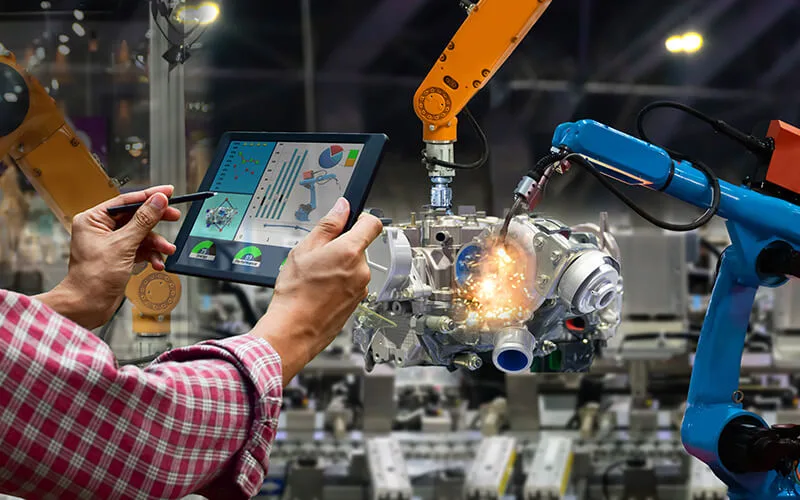24 Jan

The global market for smart manufacturing was projected to reach a value of $294.9 billion by 2030, up from $152.2 billion in 2022, with a compound annual growth rate (CAGR) of 8.6%. Deloitte’s 2024 Manufacturing industry outlook indicates that manufacturers are increasingly adopting industry 4.0 technologies and embracing the smart factory approach. As a result, digital transformation in manufacturing presents a significant opportunity to enhance all aspects of manufacturing in order to fully realize the potential of Industry 4.0.
To drive innovation and revolutionize the operations of your manufacturing business, it is essential to have a thorough understanding of digital transformation. This blog focuses on exploring the advantages of digital transformation in manufacturing, addressing potential challenges and their solutions, understanding key components, exploring use-cases, and identifying emerging technologies for a successful digital transformation journey.
What is Digital Transformation in Manufacturing Industry?
The digital transformation (DX) in the manufacturing sector involves the incorporation of advanced digital technologies like AI, data analytics, 5G, IoT, and cloud computing into different areas of the industry to achieve real-time insights, complete visibility, and adaptable solutions. This transformation is intended to enhance efficiency, productivity, and overall business operations. The primary catalysts for the transformation of digital manufacturing are software applications like CRM, Inventory management tools and digitization products like AI Bots.
Manufacturing industries are centered around product creation, monitoring, and delivery. The implementation of digital transformation can significantly enhance operational efficiency, productivity, and user experience. The key benefits of digital transformation in manufacturing industry are as followed:
1. Improved Efficency
Digital transformation in manufacturing brings about a significant shift by automating crucial processes like inventory management, production scheduling, and quality control. This automation streamlines operations, reducing manual errors and optimizing resource utilization. As a result, tasks are performed seamlessly and with precision, leading to improved overall efficiency and enhanced productivity.
2. Enhanced Product Quality
Advanced data analytics and Internet of Things (IoT) sensors are crucial for real-time monitoring of equipment and production lines. This proactive approach helps to promptly detect defects or inefficiencies, preventing substandard products from reaching consumers. Continuous monitoring and analysis contribute to maintaining consistently high product quality, which is important for customer satisfaction and brand reputation.
3. Cost Reduction
Digital solutions such as predictive maintenance and real-time monitoring are essential for cost reduction in manufacturing. Proactive maintenance measures can minimize downtime and prevent equipment failures, optimizing maintenance schedules. This not only reduces maintenance costs but also helps avoid costly production interruptions. Furthermore, digital technologies aid in monitoring and optimizing energy consumption, accurately forecasting demand, and enhancing quality control measures. These technologies provide a competitive advantage while effectively managing costs.
4. Flexibility & Agility
Digital transformation empowers manufacturing companies to become more agile and responsive to market changes. By being able to swiftly adjust production levels, switch between product lines, and customize manufacturing processes based on real-time data insights, businesses can quickly adapt to fluctuations in market demands. This flexibility ensures a competitive edge in a dynamic and rapidly evolving market environment.
5. Data-Driven Decision Making
Manufacturers can utilize the vast amount of valuable data generated by the integration of IoT devices and data analytics tools to gain actionable insights into their operations. This enables data-driven decision-making and fosters a culture of continuous process improvements within companies, ensuring that strategic decisions are based on real-time information and analysis.
6. Supply Chain Optimization
Manufacturing digital transformation offers real-time visibility and connectivity within the supply chain, enabling improved decision-making, demand-driven planning, and enhanced collaboration with suppliers and distributors. Manufacturers can monitor raw materials, track inventory levels, and optimize logistics, ensuring streamlined operations and punctual deliveries. This supply chain optimization contributes to overall efficiency and customer satisfaction.
7. Enhanced User Experience
Digital transformation can enhance user experience by offering detailed consumer journey logs, timely updates on notifications, delivery statuses of products, and customized offerings based on consumer preferences. These digital improvements can lead to higher customer satisfaction and foster loyalty. As a result, shaping a positive brand perception in the market.
Potiential Challenges of Digital Transformation in Manufacturing Industry
Investing in the Right Technology
Manufacturing companies often find it daunting and challenging to choose the right technology investments. Making the wrong choice can result in inefficiencies and therefore hinder the success of their digital transformation journey. To tackle this challenge, companies should take a strategic approach by evaluating their specific needs, prioritizing scalable solutions aligned with business goals, and collaborating with trusted vendors. In addition to this, conducting trials, assessing costs, prioritizing flexibility, and encouraging ongoing learning within the organization can ensure that technology investments align with the company’s long-term objectives.
Workforce Skills Gap
The increasing adoption of digital technologies like AI, data analytics, and cybersecurity requires a proficient workforce capable of utilizing these new tools and systems. A shortage of essential skills can impede the successful integration of digital solutions. To address this skills gap, manufacturing companies should consider investing in thorough training programs and upskilling initiatives. Collaborating with educational institutions or training providers can help ensure that employees acquire the necessary skills for digital transformation. As a result this will empower the workforce with the abilities to effectively leverage new technologies.
Cybersecurity Risks
The growing connectivity and data sharing in digital transformation expose manufacturing systems to potential cyber threats. Inadequately addressed cybersecurity risks can compromise sensitive data and disrupt operations. It is crucial to implement robust cybersecurity measures, including encryption, firewalls, regular system updates, and employee training on cybersecurity best practices. By promoting a culture of cybersecurity awareness and continuously updating defense mechanisms not only can manufacturing companies can safeguard against cyber threats but also protect their digital infrastructure.
Legacy Systems Integration
Many manufacturing facilities continue to use outdated legacy systems, which can create obstacles when trying to incorporate modern digital solutions. These legacy systems may lead to issues such as data silos, limited scalability, and potential security vulnerabilities. Employing middleware or integration platforms. These can serve as bridges between the legacy systems and new digital technologies can provide a solution. This integration ensures a smoother flow of data across different systems. Thus promoting interoperability. By addressing the challenges posed by legacy systems, manufacturing companies can successfully integrate modern digital solutions without compromising efficiency or security.
Partnering for Success with TechFlo’s Services
Explore TechFlo’s services and solutions to understand how manufacturing businesses can best benefit from digitalization. Whether it’s modernization, optimization, or complete digital transformation, TechFlo’s solutions and expertise ensures streamlined and efficient production.



